Porous Borders: Multiracial Migrations and the Law in the U.S.-Mexico Borderlands
ICW Borderlands Series: In Conversation with Julian Lim
December 2, 2019
Ahmanson Classroom, Botanical Center, The Huntington
With the railroad’s arrival in the late nineteenth century, immigrants of all colors rushed to the U.S.-Mexico borderlands, transforming the region into a booming international hub of economic and human activity. Following the stream of Mexican, Chinese, and African American migration, Julian Lim presents a fresh study of the multiracial intersections of the borderlands, where diverse peoples crossed multiple boundaries in search of new economic opportunities and social relations. However, as these migrants came together in ways that blurred and confounded elite expectations of racial order, both the United States and Mexico resorted to increasingly exclusionary immigration policies in order to make the multiracial populations of the borderlands less visible within the body politic, and to remove them from the boundaries of national identity altogether.
Using a variety of English- and Spanish-language primary sources from both sides of the border, Lim reveals how a borderlands region that has traditionally been defined by Mexican-Anglo relations was in fact shaped by a diverse population that came together dynamically through work and play, in the streets and in homes, through war and marriage, and in the very act of crossing the border.
-
Julian Lim is an associate professor of History at Arizona State University. She holds a bachelor’s degree in literature and a law degree from UC Berkeley, and received her doctorate in history from Cornell University. Trained in history and law, she focuses on immigration, borders, and race, and has taught in both history department and law school settings.
Lim’s award-winning first book, Porous Borders: Multiracial Migrations and the Law in the U.S.-Mexico Borderlands (University of North Carolina Press, 2017), examines the history of diverse immigrants in the U.S.-Mexico borderlands, and the development of immigration policy and law on both sides of the border. The book received the David J. Weber-Clements Center Prize for the best book on the American Southwest; the Outstanding Achievement in History award from the Association for Asian American Studies; the Humanities Book Award from the Institute for Humanities Research; and an Honorable Mention for the Theodore Saloutos Memorial Book Award for the best book on U.S. immigration history.
She has published articles on race, immigration and refugee law, and the U.S.-Mexico borderlands in the Pacific Historical Review, the California Law Review, and the U.C. Irvine Law Review. She is also the recipient of various research and travel awards and fellowships. She is currently working on her second book: an examination of U.S. territorial control and border expansions from the 1880s to the 1910s, and the correlating development of the plenary power doctrine in U.S. immigration law.
L.A. City Councilmembers in Conversation
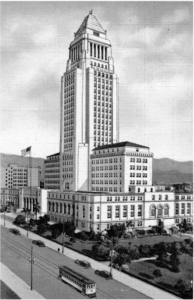
November 22, 2019
Haaga Hall, The Huntington
The panel includes former city councilmembers Wendy Greuel, Mike Hernandez, Tom LaBonge, Mike Woo, and Zev Yaroskavsky, moderated by Caitlin Parker. This session took place in-person at 10:30am in Haaga Hall at The Huntington Library.
This programming is brought to you in partnership with the LA History & Metro Studies Group.
_________________________________________________________________________
Imperial Metropolis: Los Angeles, Mexico, and the Borderlands of American Empire, 1865–1941
ICW Borderlands Series: In Conversation with Jessica Kim
November 21, 2109
Ahmanson Classroom, Botanical Center, The Huntington
In this compelling narrative of capitalist development and revolutionary response, Jessica M. Kim reexamines the rise of Los Angeles from a small town to a global city against the backdrop of the U.S.-Mexico borderlands, Gilded Age economics, and American empire. It is a far-reaching transnational history, chronicling how Los Angeles boosters transformed the borderlands through urban and imperial capitalism at the end of the nineteenth century and how the Mexican Revolution redefined those same capitalist networks into the twentieth.
Kim draws on archives in the United States and Mexico to argue that financial networks emerging from Los Angeles drove economic transformations in the borderlands, reshaped social relations across wide swaths of territory, and deployed racial hierarchies to advance investment projects across the border. However, the Mexican Revolution, with its implicit critique of imperialism, disrupted the networks of investment and exploitation that had structured the borderlands for sixty years, and reconfigured transnational systems of infrastructure and trade. Kim provides the first history to connect Los Angeles’s urban expansionism with more continental and global currents, and what results is a rich account of real and imagined geographies of city, race, and empire.
-
Jessica Kim, PhD, is an associate professor of history at California State University, Northridge. She specializes in the history of the American West, the U.S.-Mexico borderlands, urban history, and public and digital history. Her book, Imperial Metropolis: Los Angeles, Mexico, and the Borderlands of American Empire, 1865-1941, was published by the University of North Carolina Press in 2019. The book explores the rise of Los Angeles and investment in Mexico. It was the 2020 co-winner of the Kenneth Jackson Award for best book from the Urban History Association and a finalist for the David J. Weber book prize from the Western History Association. At Northridge, she teaches courses in U.S. history, the history of Los Angeles and California, the U.S. West, and public history. Jessica is also the social media coordinator for the Huntington-USC Institute on California and the West. She received her PhD in history from the University of Southern California in 2012.
Symposium
Night in the City: LA After Dark Event (Day 3)
November 16, 2019
USC Doheny Memorial Library, 2nd Floor
The Natural History Museums of Los Angeles County and the Huntington-USC Institute on California and the West are delighted to present a three-part series considering Los Angeles after dark. Topics include the noir landscapes of films and novels, nocturnal adaptations, the science of our evening L.A. skies, and more. What is it about Los Angeles that has so captivated writers and filmmakers, and what can we learn when we throw shade on our famed sunshine to investigate the city in darkness?
Check out the symposium schedule here.
This series is supported by the USC Libraries Collections Convergence Initiative (CCI) and the Harman Academy for Polymathic Study of USC Libraries.
_________________________________________________________________________
L.A. on the Grid: The Benefits and Costs of Lighting up the Night
Night in the City: LA After Dark Event (Day 2)
October 29, 2019
Natural History Museum
The Natural History Museums of Los Angeles County and the Huntington-USC Institute on California and the West are delighted to present a three-part series considering Los Angeles after dark. Topics include the noir landscapes of films and novels, nocturnal adaptations, the science of our evening L.A. skies, and more. What is it about Los Angeles that has so captivated writers and filmmakers, and what can we learn when we throw shade on our famed sunshine to investigate the city in darkness?
This series is supported by the USC Libraries Collections Convergence Initiative (CCI) and the Harman Academy for Polymathic Study of USC Libraries.
_________________________________________________________________________
The Founder and the Future: Becoming Henry Huntington
October 23, 2019
The Huntington
William Deverell, director of the Huntington-USC Institute on California and the West, explores the life of Henry E. Huntington (1850-1927) against the backdrop of American history.
This program is a Haynes Foundation Lecture of The Huntington.
-
William F. Deverell received his undergraduate degree from Stanford University in American Studies with honors and distinction. He received his Ph.D. in American History from Princeton University. He is Professor of History at the University of Southern California and Director of the Huntington-USC Institute on California and the West, which was founded in 2004. He also directs the USC Libraries Collections Convergence Initiative. He previously taught at the California Institute of Technology and the University of California, San Diego.
Professor Deverell teaches and writes about the nineteenth and twentieth century American West. He is the author, editor, or co-editor of numerous books exploring a variety of topics and themes. They include The Blackwell Companion to Los Angeles (co-edited with Greg Hise); The Blackwell Companion to California History (co-edited with David Igler); and The Blackwell Companion to the History of the American West. He is the author of Whitewashed Adobe: The Rise of Los Angeles and the Remaking of Its Mexican Past and of Railroad Crossing: Californians and the Railroad, 1850-1910, as well as the recently-published Kathy Fiscus: A Tragedy that Transfixed the Nation. With the historian Tom Sitton, he is the co-editor of Metropolis in the Making: Los Angeles in the 1920s and California Progressivism Revisited. With Greg Hise, he co-authored Eden by Design: The 1930 Olmsted-Bartholomew Plan for the Los Angeles Region and co-edited Land of Sunshine: An Environmental History of Metropolitan Los Angeles. He and Professor Anne Hyde of the University of Oklahoma co-authored the two volume Shaped by the West: A History of North America.
Frontiers in the Gilded Age: Adventure, Capitalism, and Dispossession from Southern Africa to the U.S.-Mexican Borderlands, 1880-1917
ICW Borderlands Series: In Conversation with Andrew Offenburger
October 21, 2019
Ahmanson Classroom, Botanical Center, The Huntington
This book begins in an era when romantic notions of American frontiering overlapped with Gilded Age extractive capitalism. In the late nineteenth century, the U.S.-Mexican borderlands constituted one stop of many where Americans chased capitalist dreams beyond the United States. Crisscrossing the American West, southern Africa, and northern Mexico, Andrew Offenburger examines how these frontier spaces could glitter with grandiose visions, expose the flawed and immoral strategies of profiteers, and yet reveal the capacity for resistance and resilience that indigenous people summoned when threatened. Linking together a series of stories about Boer exiles who settled in Mexico, a global network of protestant missionaries, and adventurers involved in the parallel displacements of indigenous peoples in Rhodesia and the Yaqui Indians in Mexico, Offenburger situates the borderlands of the Mexican North and the American Southwest within a global system, bound by common actors who interpreted their lives through a shared frontier ideology.
-
Dr. Andrew Offenburger is an assistant professor of history at Miami University (Oxford, Ohio). His research investigates frontiers, borders, colonialism, and indigenous history, and how these topics connect the U.S. West to similar processes in Latin America and Africa.
Before joining Miami in 2015, Offenburger was the David J. Weber Postdoctoral Fellow at Southern Methodist University’s Clements Center for Southwest Studies (2014-2015). He earned his Ph.D. in U.S. history from Yale University in 2014.
Shining a Light on the Night Shift: NIGHTSHIFT Screening and Panel Discussion
Night in the City: LA After Dark Event (Day 1)
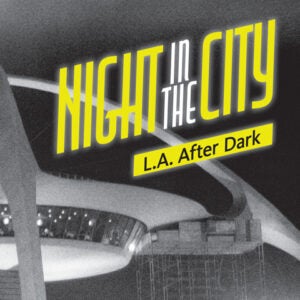
October 15, 2021
Natural History Museum
*The audio recording is not available.
The Natural History Museums of Los Angeles County and the Huntington-USC Institute on California and the West are delighted to present a three-part series considering Los Angeles after dark. Topics include the noir landscapes of films and novels, nocturnal adaptations, the science of our evening L.A. skies, and more. What is it about Los Angeles that has so captivated writers and filmmakers, and what can we learn when we throw shade on our famed sunshine to investigate the city in darkness?
This series is supported by the USC Libraries Collections Convergence Initiative (CCI) and the Harman Academy for Polymathic Study of USC Libraries.
_________________________________________________________________________
“Virginia 1619: A California Conversation” (EMSI Annual Conference)
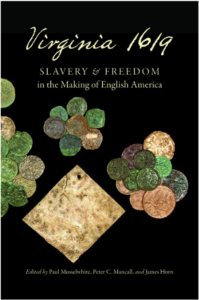
September 20, 2019
Ahmanson Classroom, Botanical Center, The Huntington
Virginia 1619 provides an opportunity to reflect on the origins of English colonialism around the Chesapeake Bay and the Atlantic world. As the essays here demonstrate, Anglo-Americans have been simultaneously experimenting with representative government and struggling with the corrosive legacy of racial thinking for more than four centuries. Virginia, contrary to popular stereotypes, was not the product of thoughtless, greedy, or impatient English colonists. Instead, the emergence of stable English Atlantic colonies reflected the deliberate efforts of an array of actors to establish new societies based on their ideas about commonwealth, commerce, and colonialism. Looking back from 2019, we can understand that what happened on the shores of the Chesapeake four hundred years ago was no accident. Slavery and freedom were born together as migrants and English officials figured out how to make this colony succeed. They did so in the face of rival ventures and while struggling to survive in a dangerous environment. Three hallmarks of English America–self-government, slavery, and native dispossession–took shape as everyone contested the future of empire along the James River in 1619.
More information on the EMSI panel can be found here.
This conference is co-sponsored by the EMSI American Origins Seminar Series and the Huntington-USC Institute on California and the West.
_________________________________________________________________________
In the Country of Women: A Conversation between Susan Straight and Lisa See
September 16, 2019
Rothenberg Hall, The Huntington
Award-winning author Susan Straight is joined by novelist Lisa See for a conversation about Straight’s powerful new memoir, In the Country of Women, which traces the lives of six generations of immigrant and multiracial women in her extended family.
-
Susan Straight has published eight novels, including Highwire Moon, Between Heaven and Here, and A Million Nightingales. She has been a finalist for the National Book Award, the Los Angeles TimesBook Prize, and the National Magazine Award. She is the recipient of the Robert Kirsch Award for lifetime achievement from the Los Angeles TimesBook Prize, the Edgar Award for Best Short Story, the O. Henry Prize, the Lannan Literary Award for Fiction, and a Guggenheim Fellowship. Her stories and essays have been published inThe New Yorker, The New York Times, the Los Angeles Times, The Guardian, Granta, McSweeney’s, Black Clock, Harper’s, and other journals. She is Distinguished Professor of Creative Writing at the University of California, Riverside. She was born in Riverside, where she lives with her family.
-
Lisa See is The New York Times bestselling author of The Tea Girl of Hummingbird Lane, Snow Flower and the Secret Fan, Peony in Love, Shanghai Girls, China Dolls, and Dreams of Joy, which debuted at #1. She is also the author of On Gold Mountain, which tells the story of her Chinese American family’s settlement in Los Angeles. See has also written a mystery series that takes place in China. Her books have been published in 39 languages. See was the recipient of the Golden Spike Award from the Chinese Historical Association of Southern California and the History Maker’s Award from the Chinese American Museum. She was also named National Woman of the Year by the Organization of Chinese American Women.
Western Histories in the Making: Graduate Student Presentations
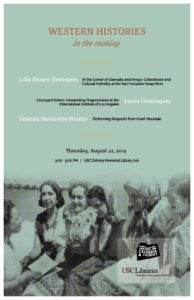
August 22, 2019
USC Doheny Memorial Library 240
Presented by ICW and CCI at the third Western Histories in the Making, three graduate students presented their work and their research paths to continue fostering a connection between ICW and Doheny Library.
-
“At the Corner of Glenoaks and Arroyo: Collectivism and Cultural Hybridity at the San Fernando Swap Meet ”
By the mid 1980s, the swap meet industry reached its height as a cornerstone of Southern California’s LatinX immigrant and working class communities. Swap meets became a viable source of income for newcomers and helped them build social networks. Less than a decade later, swap meets faced racist attacks. Cities permanently closed locations. The mainstream media emphasized crime rates and counterfeit goods. Yet swap meets have persisted. Their resemblance to the pre-Hispanic tianguis market, affordable prices, and familial atmosphere continue to attract millions of vendors and shoppers each year. In this case study of the San Fernando Swap Meet, Brown-Bernstein demonstrates that swap meets are an enduring space of class solidarity and cultural hybridity.
-
“Courtyard Sisters: Interpreting Progressivism at the International Institute of Los Angeles”
On a January afternoon in 1932, a multiracial assembly of Los Angeles residents gathered in Boyle Heights to dedicate a new building as a tribute to the city’s international character and progressive spirit. For nearly two decades, social workers at the International Institute of Los Angeles had served thousands of immigrant women from their perch on the city’s eastside. The organization’s new Spanish Colonial Revival structure reaffirmed its vow to fashion worthy citizens and to model inter-group cooperation. Laura Dominguez’s work explores how this understudied group of reformers policed the borders of Anglo settler imaginations in Progressive-Era Los Angeles and contemplates the built legacy of Americanization in the city today.
Julia’s article, “Under the Canopy: Finding Belonging at the San Fernando Swap Meet, 1976-2019” was published in the Journal of American Ethnic History fall 2021.
Before pursuing her PhD, Julia was a public school teacher in the San Fernando Valley. She holds an M.Ed. from UCLA and a Bachelor’s degree from Oberlin College.
-
“Performing Requests from Heart Mountain”
Kazuko Hata wrote to his friend and fellow-farmer, Don McDonald, requesting his help in locating belongings left behind in Wapato, Washington. Mr. Hata sent the letter from Heart Mountain, Wyoming on May 4, 1943, just a few short months after his family and neighbors were evacuated from the Yakima Valley. Mr. Hata’s letter is one of 57 that McDonald’s family kept in their family archive. In the span of four years, McDonald received and responded to dozens of individuals as they requested favors, inquired about the harvest, and negotiated the use of their place of worship, the Yakima Buddhist Bussei Kaikan. Rather than read the letters through the logics of resistance or agency, which has the potential for a contrary read of defeat or passivity, I read these letters to illuminate the performance of requesting, or in other words, the ways in which Japanese individuals utilized their connections to allies to make their requests known, express their desires, and advocate for their needs.
The Browns of California: A Conversation with Governor Jerry Brown
May 21, 2019
Rothenberg Hall, The Huntington and Simulcast in Haaga Hall, The Huntington
Join ICW for a conversation with Governor Jerry Brown and Miriam Pawel, moderated by ICW Director William Deverell.
A book signing with author Miriam Pawel followed the event.
-
Edmund Gerald, “Jerry”, Brown Jr. served as California’s 34th and 39th Governor (1975-1983) and (2011-2019). With four terms as Governor, he is the longest-serving chief executive of the state of California.
-
Miriam Pawel is the author of The Browns of California: The Family Dynasty that Transformed a State and Shaped a Nation, a 2018 Los Angeles Times Book Prize finalist.
Dear Los Angeles: The City in Diaries and Letters 1542 to 2018
May 7, 2020
Ahmanson Classroom, Botanical Center, The Huntington
Join David Kipen and Lynell George as they discuss and read a few letters from Dear Los Angeles.
The City of Angels has played a distinct role in the hearts, minds, and imaginations of millions of people, who see it as the ultimate symbol of the American Dream. David Kipen, a cultural historian and avid student of Los Angeles, has scoured libraries, archives, and private estates to assemble a kaleidoscopic view of a truly unique city. From the Spanish missionary expeditions in the early 1500s to the Golden Age of Hollywood to the strange new world of social media, the collection of letters in Dear Los Angeles is a slice of life in L.A. through the years. The pieces are arranged by date—January 1st to December 31st—featuring selections from different decades and centuries. What emerges is a vivid tapestry of insights, personal discoveries, and wry observations that together distill the essence of the city.
-
David Kipen is the former literature director of the National Endowment for the Arts, and currently serves as book critic for Los Angeles Magazine and critic-at-large for the Los Angeles Times and teaches in the writing program at UCLA. Born and raised in Los Angeles, Kipen opened the Boyle Heights bookstore and lending library Libros Schmibros in 2010. The former book editor/critic of the San Francisco Chronicle and contributor to multiple volumes of California cultural history, Kipen holds a degree in literature from Yale University.
-
Lynell Georgeis a Los Angeles-based journalist and essayist. She is the author of No Crystal Stair African Americans in the City of Angels and After/Image: Los Angeles Outside the Frame, a collection of her essays and photographs. She won a 2018 GRAMMY for liner notes for “Otis Redding Live at the Whisky A Go Go.”
The Archival Future of the Iron Horse: California Railroad Collections at the Sesquicentennial of the Transcontinental Railroad
April 26, 2019
USC Doheny Memorial Library
This year marks the sesquicentennial of the Transcontinental Railroad. With perspectives of engineering and public history as well as the dynamic dimension of social and ethnic history reflected by the Chinese Railroad Workers Project, “The Archival Future of the Iron Horse” considers the present and future of railroad collections. Recognizing that the overwhelming physical bulk of railroad records, especially in the case of those generated by major railroad carriers, represents continuing challenges in housing, preservation, and reference service for archival institutions large and small, this panel, comprised of archivists and historians, will consider whether we should continue to collect such records, how they are being put to use today, and what promise they hold for the future.
This programming is brought to by the Huntington-USC Institute on California and the West, USC Sidney Harman Academy for Polymathic Study, USC Libraries & the USC Libraries Collections Convergence Initiative (CCI).
-
Chris Rockwell is the Librarian for the California State Railroad Museum (CSRM) Library & Archives that provides free public access to the Railroad Museum’s impressive and extensive documentary collections. With a Master’s in Library and Information Science from San Jose State University, Chris joins the CSRM Library & Archives most recently from California State University, Sacramento (CSUS) where he worked as a staff archivist for 10 years. In that role, a few of his responsibilities included overseeing assistants and staff working on various archival related projects; providing research and reference to the campus community and public; arranging and describing collections; cataloging books and manuscripts; and providing valuable outreach to the community.
-
Gordon Chang is an Olive H. Palmer Professor in Humanities/Professor of American History at Stanford University and Co-Director of the Chinese Railroad Workers in North America Project. He is interested in several different areas of history, including the historical connections between race and ethnicity in America, on the one hand, and foreign relations, on the other, and trans-Pacific relations in their diplomatic as well as their cultural and social dimensions. He has written and continue to publish in the areas of U.S. diplomacy, America-China relations, the Chinese diaspora, Asian American history, and global history. His most recent books have examined the history of Chinese railroad workers in America in the 19th century.
-
Dr. Clay Stalls stewards The Huntington’s 20th-century California materials as well as its Hispanic collections, dating from the 15th century to the present. Before coming to The Huntington, Clay was manuscripts curator in the Department of Archives and Special Collections at Loyola Marymount University. Stalls holds the M.L.I.S. and Ph.D. in history from the University of California at Los Angeles and has had the privilege of serving as president of the Society of California Archivists. He has published in California history as well as medieval Iberian history.
-
Dr. Peter Blodgett received his bachelor’s degree in American history from Bowdoin College and his doctorate from Yale University. Since joining The Huntington in 1985, he has overseen the Library’s collections related to the history of the North American West from 1800 to the present. Blodgett has spoken and published widely on national parks, tourism and recreation, as well as the management of manuscripts and archives. His most recent projects include “Geographies of Wonder,” two consecutive exhibitions on America’s national parks, and an edited volume, Motoring West: Volume 1 Automobile Pioneers, 1900-1909 (University of Oklahoma Press, 2015).
-
Theresa Salazar has been the Curator of The Bancroft Collection, Western Americana since July of 1999. In 2004, she took on the responsibility for the Latin Americana collections of The Bancroft Library and oversaw that collection for twelve years. She is responsible for acquisitions related to Western Americana, from the colonial period to the present. She regularly teaches students about conducting research in The Bancroft Library.
Policing Los Angeles: Race, Resistance, and the Rise of the LAPD
April 15, 2019
USC Doheny Memorial Library 241
When the Los Angeles neighborhood of Watts erupted in violent protest in August 1965, the uprising drew strength from decades of pent-up frustration with employment discrimination, residential segregation, and poverty. But the more immediate grievance was anger at the racist and abusive practices of the Los Angeles Police Department. Yet in the decades after Watts, the LAPD resisted all but the most limited demands for reform made by activists and residents of color, instead intensifying its power.
In Policing Los Angeles, Max Felker-Kantor narrates the dynamic history of policing, anti-police abuse movements, race, and politics in Los Angeles from the 1965 Watts uprising to the 1992 Los Angeles rebellion. Using the explosions of two large-scale uprisings in Los Angeles as bookends, Felker-Kantor highlights the racism at the heart of the city’s expansive police power through a range of previously unused and rare archival sources. His book is a gripping and timely account of the transformation in police power, the convergence of interests in support of law and order policies, and African American and Mexican American resistance to police violence after the Watts uprising.
This programming is brought to you by the Huntington-USC Institute on California and the West, USC Sidney Harman Academy for Polymathic Study, USC Libraries and the USC Libraries Collections Convergence Initiative (CCI).
-
Max Felker-Kantor has taught at Ball State as Visiting Assistant Teaching Professor of History since 2018. He received his PhD in 2014 from the University of Southern California. This fall he joins us on the tenure-line as Assistant Professor of History. He teaches courses in twentieth-century American and African American history with a focus on race, politics, and social movements. He is particularly interested in the policies and institutions of urban law enforcement and criminal justice systems since World War II. His articles and book chapters have been published in the Journal of Urban History, Journal of Civil and Human Rights, Boom California, Black and Brown Los Angeles: A Contemporary Reader, the Pacific Historical Review, and the Casden Annual Review. Dr. Felker-Kantor’s first book, Policing Los Angeles: Race, Resistance, and the Rise of the LAPD was published by the University of North Carolina Press in 2018. Currently, he is researching schools, inner city policing and the D.A.R.E. program.
Once Upon a Time in Korean America: Introducing the Literary Archive of Nak Chung Thun (1875-1953)
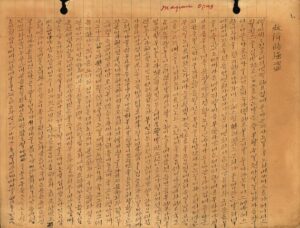
March 19, 2019
USC Doheny Memorial Library 240
Born in Pyŏngan Province in today’s North Korea, Nak Chung Thun(1875-1953) emigrated to California via Hawaii in 1907, settling in Riverside and working as a laborer for most of his life. Until his passing in 1953, Thun privately wrote dramas and epic fiction in his native tongue, leaving behind a literary estate that is today a precious discovery for both Korean and Korean American literary historians.
This event will provide the first scholarly treatment of Thun’s archive, which is part of the collection of the East Asian Library at the University of Southern California, through three studies that address its history as well as its contents. By way of contextualization, Edward Chang (UC Riverside) will offer an ethnographic and historical account of Riverside’s Pachappa Camp, which was the very first Korean enclave in the United States. Ji-Young Yi (Chungbuk University) will then shift the focus to Thun’s literary production, looking in particular at two full-length novels that, while set in Thun’s native Korean province, can revealingly be read along with the earliest examples of diasporic Korean American literature. Finally, Jae-moon Hwang (Seoul National University) will discuss the thematic, formal, and linguistic characteristics of Thun’s short stories that are set in Los Angeles and Riverside. The panelists will address the current editorial state of the Thun archive all the while detailing the initiatives that are underway to bring some of it to publication. Joining them will be Steven Lee (UC Berkeley) and Naoki Watanabe (Musashi University) as discussants and USC’s Kenneth Klein and Sunyoung Park as moderators.
This programming is brought to you by USC Libraries and the USC Libraries Collections Convergence Initiative (CCI).
___________________________________________________________________
Busted: Brash Stories from Texas and New Mexico
March 7, 2019
Rothenberg Hall, The Huntington
Join us for a discussion with Bryan Mealer and Joshua Wheeler, the authors of new books about hardscrabble times, places, and people in Texas and New Mexico.
Mealer’s The Kings of Big Spring, which has been called “the Texas version of Hillbilly Elegy,” is a saga of God, family, and oil across many generations of the author’s own family. Wheeler’s Acid West, a collection of essays about Southern New Mexico, has been called a “freaky, stylish, heart-cracking-open book.” The evening’s discussion is moderated by Gustavo Arellano, Los Angeles Times.
A reception and booksigning followed the program.
This programming is brought to you by The Huntington-USC Institute on California and the West, The Huntington Library Research Division, The Journal of Alta California and the USC Alumni Association.
-
Bryan Mealer is the author of Muck City and the New York Times bestseller The Boy Who Harnessed the Wind written with William Kamkwamba which has been translated into more than a dozen languages and is the basis of a major motion picture. He’s also the author of All Things Must Fight to Live, which chronicled his time covering the war in the Democratic Republic of Congo for the Associated Press and Harper’s. His other work has appeared in Texas Monthly, Esquire, the Guardian, and the New York Times. Mealer and his family live in Austin.
-
Joshua Wheeler is from Alamogordo, New Mexico. His essays have appeared in many literary journals, including The Iowa Review, Sonora Review, PANK, and the Missouri Review. He has written feature stories for BuzzFeed and Harper’s Magazine online and is a coeditor of the anthology We Might as Well Call It the Lyric Essay. He is a graduate of the University of Southern California, and New Mexico State University, and has an MFA in nonfiction writing from the University of Iowa. He teaches creative writing at Louisiana State University.
-
Gustavo Arellano is a longtime chronicler of California and the Southwest, and currently is a features writers for the Los Angeles Times. He has traveled through the Panhandle and New Mexico every summer for the past decade.
Carleton Watkins: Making the West American
ICW In Conversation with Tyler Green
February 21, 2019
Rothenberg Hall, The Huntington
Join us for a discussion between Tyler Green and ICW Director William Deverell about Tyler’s magisterial new biography of the great landscape photographer Carleton Watkins. Our discussion will range broadly across such topics as the West and the Civil War, the rise of Yosemite and the National Park idea, and the fascinating life of arguably the greatest photographer in all of American history. The Huntington is home to one of the world’s most important collections of Watkins photography, and Tyler Green will discuss his research and writing drawn from that archive.
-
Tyler Green is an historian, critic and author whose work examines the ways in which artists and their work have engaged with and impacted national histories. Green is also the producer and host of The Modern Art Notes Podcast, the leading audio program about art.
Green’s most recent book is Emerson’s Nature and the Artists: Idea as Landscape, Landscape as Idea. It was published by Prestel in October 2021. The book features a new consideration of Ralph Waldo Emerson’s classic 1836 text, new research that reveals how Nature was informed by Emerson’s engagement with American art, and critical analysis of how the ideas Emerson presented in Nature informed American art for 100 years after Nature was published. Emerson’s Nature also examines how Emerson joined his Anglo-Saxonist white-race theory to ideas about nature in ways that helped bake whiteness into the American landscape tradition. The book features about 75 artworks reproduced in-line with Green’s essays and within the text of Emerson’s Nature. In adherence with Emerson’s landmark definition of landscape as a public commons, all of the images in the book come from museums and libraries with open-access policies.
The Entrepreneurial Frontier: The West and American Innovation, 1800 to the present (Haaga Lecture)
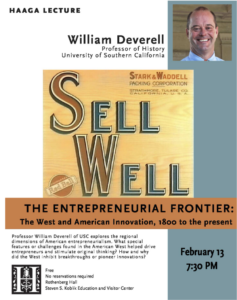
February 13, 2019
Rothenberg Hall, The Huntington
Professor William Deverell of USC explores the regional dimensions of American entrepreneurialism. What special features or challenges found in the American West helped drive entrepreneurs and stimulate original thinking? How and why did the West inhibit breakthroughs or pioneer innovations?
-
William F. Deverell received his undergraduate degree from Stanford University in American Studies with honors and distinction. He received his Ph.D. in American History from Princeton University. He is Professor of History at the University of Southern California and Director of the Huntington-USC Institute on California and the West, which was founded in 2004. He also directs the USC Libraries Collections Convergence Initiative. He previously taught at the California Institute of Technology and the University of California, San Diego.
Professor Deverell teaches and writes about the nineteenth and twentieth century American West. He is the author, editor, or co-editor of numerous books exploring a variety of topics and themes. They include The Blackwell Companion to Los Angeles (co-edited with Greg Hise); The Blackwell Companion to California History (co-edited with David Igler); and The Blackwell Companion to the History of the American West. He is the author of Whitewashed Adobe: The Rise of Los Angeles and the Remaking of Its Mexican Past and of Railroad Crossing: Californians and the Railroad, 1850-1910, as well as the recently-published Kathy Fiscus: A Tragedy that Transfixed the Nation. With the historian Tom Sitton, he is the co-editor of Metropolis in the Making: Los Angeles in the 1920s and California Progressivism Revisited. With Greg Hise, he co-authored Eden by Design: The 1930 Olmsted-Bartholomew Plan for the Los Angeles Region and co-edited Land of Sunshine: An Environmental History of Metropolitan Los Angeles. He and Professor Anne Hyde of the University of Oklahoma co-authored the two volume Shaped by the West: A History of North America.